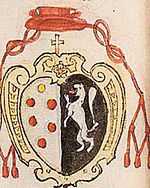Guido Luca Ferrero

Guido Luca Ferrero (1537–1585) was an Italian Roman Catholic bishop and cardinal.
Biography
Guido Luca Ferrero was born in Turin on May 18, 1537, the son of Sebastiano Ferrero, signore of Casalvolone and Villata, and his wife Maddalena Borromeo, daughter of Federico Borromeo, 6th count of Arona and a member of the House of Borromeo.[1] He was the grand-nephew of Cardinals Gianstefano Ferrero and Bonifacio Ferrero; the nephew of Cardinals Filiberto Ferrero and Pier Francesco Ferrero; and the cousin of Cardinal Charles Borromeo.[1]
He was educated by his uncle Cardinal Pier Francesco Ferrero.[1] He spoke Latin and Greek well.[1]
In 1559, he became a domestic prelate and a referendary of the Apostolic Signatura.[1]
He was elected Bishop of Vercelli on March 2, 1562 and he was subsequently consecrated as a bishop.[1] In 1564, he became nuncio to the Republic of Venice.[1]
Pope Pius IV made him a cardinal deacon in the consistory of March 12, 1565.[1] He participated in the papal conclave of 1565-66 that elected Pope Pius V.[1] He received the red hat and the deaconry of Sant'Eufemia (a titular church declared a deaconry pro illa vice) on February 8, 1566.[1] On March 6, 1566, he opted for the deaconry of Santi Vito, Modesto e Crescenzia.[1] He participated in the papal conclave of 1572 that elected Pope Gregory XIII.[1] He resigned the government of the Diocese of Vercelli sometime before October 17, 1572.[1]
He was governor of Spoleto from 1572 to 1578.[1] He became Prior of Santa Maria di Pellionex in 1572, and provost of San Martino degli Umiliati, Vercelli in 1575.[1] On October 25, 1581, he was appointed papal legate in Romagna.[1] He was named Governor of Faenza ca. 1583.[1] He participated in the papal conclave of 1585 that elected Pope Sixtus V.[1]
He died in Rome on May 16, 1585.[1] He was buried in the Basilica di Santa Maria Maggiore.[1]
References
- ↑ 1.0 1.1 1.2 1.3 1.4 1.5 1.6 1.7 1.8 1.9 1.10 1.11 1.12 1.13 1.14 1.15 1.16 1.17 1.18 1.19 Entry from Biographical Dictionary of the Cardinals of the Holy Roman Church